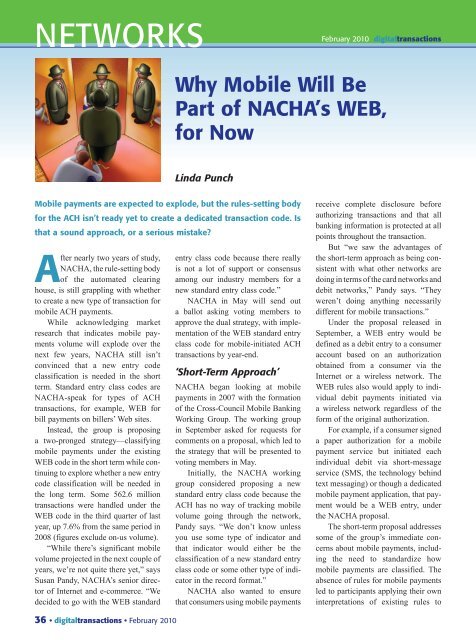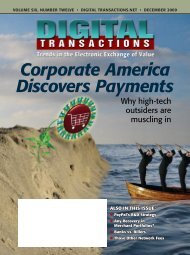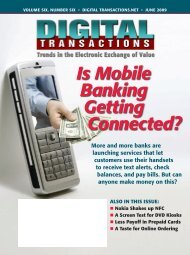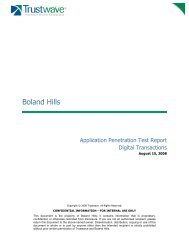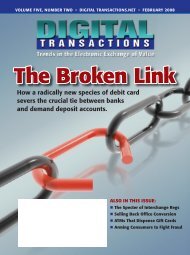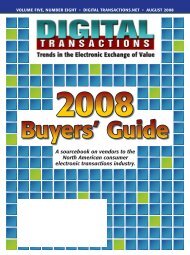Sudden Allure - Digital Transactions
Sudden Allure - Digital Transactions
Sudden Allure - Digital Transactions
- No tags were found...
You also want an ePaper? Increase the reach of your titles
YUMPU automatically turns print PDFs into web optimized ePapers that Google loves.
NETWORKSFebruary 2010 digitaltransactionsWhy Mobile Will BePart of NACHA’s WEB,for NowLinda PunchMobile payments are expected to explode, but the rules-setting bodyfor the ACH isn’t ready yet to create a dedicated transaction code. Isthat a sound approach, or a serious mistake?After nearly two years of study,NACHA, the rule-setting bodyof the automated clearinghouse, is still grappling with whetherto create a new type of transaction formobile ACH payments.While acknowledging marketresearch that indicates mobile paymentsvolume will explode over thenext few years, NACHA still isn’tconvinced that a new entry codeclassification is needed in the shortterm. Standard entry class codes areNACHA-speak for types of ACHtransactions, for example, WEB forbill payments on billers’ Web sites.Instead, the group is proposinga two-pronged strategy—classifyingmobile payments under the existingWEB code in the short term while continuingto explore whether a new entrycode classification will be needed inthe long term. Some 562.6 milliontransactions were handled under theWEB code in the third quarter of lastyear, up 7.6% from the same period in2008 (figures exclude on-us volume).“While there’s significant mobilevolume projected in the next couple ofyears, we’re not quite there yet,” saysSusan Pandy, NACHA’s senior directorof Internet and e-commerce. “Wedecided to go with the WEB standardentry class code because there reallyis not a lot of support or consensusamong our industry members for anew standard entry class code.”NACHA in May will send outa ballot asking voting members toapprove the dual strategy, with implementationof the WEB standard entryclass code for mobile-initiated ACHtransactions by year-end.‘Short-Term Approach’NACHA began looking at mobilepayments in 2007 with the formationof the Cross-Council Mobile BankingWorking Group. The working groupin September asked for requests forcomments on a proposal, which led tothe strategy that will be presented tovoting members in May.Initially, the NACHA workinggroup considered proposing a newstandard entry class code because theACH has no way of tracking mobilevolume going through the network,Pandy says. “We don’t know unlessyou use some type of indicator andthat indicator would either be theclassification of a new standard entryclass code or some other type of indicatorin the record format.”NACHA also wanted to ensurethat consumers using mobile paymentsreceive complete disclosure beforeauthorizing transactions and that allbanking information is protected at allpoints throughout the transaction.But “we saw the advantages ofthe short-term approach as being consistentwith what other networks aredoing in terms of the card networks anddebit networks,” Pandy says. “Theyweren’t doing anything necessarilydifferent for mobile transactions.”Under the proposal released inSeptember, a WEB entry would bedefined as a debit entry to a consumeraccount based on an authorizationobtained from a consumer via theInternet or a wireless network. TheWEB rules also would apply to individualdebit payments initiated viaa wireless network regardless of theform of the original authorization.For example, if a consumer signeda paper authorization for a mobilepayment service but initiated eachindividual debit via short-messageservice (SMS, the technology behindtext messaging) or though a dedicatedmobile payment application, that paymentwould be a WEB entry, underthe NACHA proposal.The short-term proposal addressessome of the group’s immediate concernsabout mobile payments, includingthe need to standardize howmobile payments are classified. Theabsence of rules for mobile paymentsled to participants applying their owninterpretations of existing rules to36 digitalFebruary 2010


